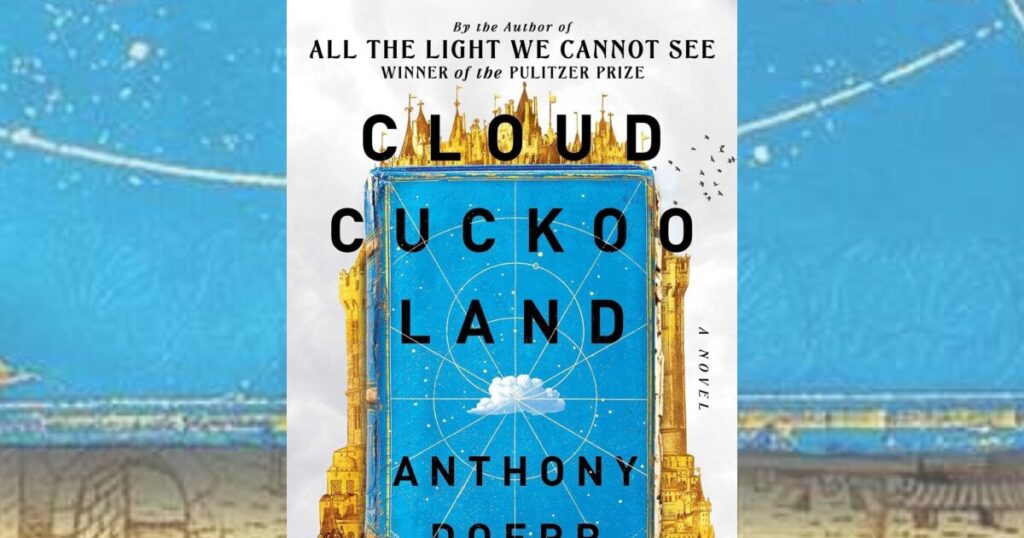Note: If you wish to receive, via e-mail, (1) my weekly newsletter or (2) daily copies of these posts, notify me at rrbates1951@gmail.com and indicate which you would like. I promise not to share your e-mail address with anyone. To unsubscribe, send me a follow-up email.
Tuesday
Several years ago Dan Bloom coined the generic label “cli-fi” for fiction that features climate change. Classic works in the genre included Octavia Butler’s Parable of the Sower, Margaret Atwood’s Oryx and Crake trilogy, and Barbara Kingsolver’s Flight Behavior. I’ve just discovered and finished reading two more that can be added to the list, Richard Powers’s Pulitzer-prize winning The Overstory (2018) and Anthony Doerr’s Cloud Cuckoo Land (2021). I include them in the genre because they both feature sensitive characters who are so upset at what humans are doing to the environment that they engage in acts of eco-terrorism.
We’ll know that we’re in real trouble when extreme weather events appear the norm, functioning as mere backdrop in our stories. The cli-fi genre will endure for only so long as authors and their characters rage against the dying of the planet.
In both Overstory and Cuckoo Land, we encounter outrage at how capitalism and human greed continue felling our trees and warming the earth. Powers emerges, I suppose, as the more optimistic of the two since he observes that trees are fantastic problem solvers. As his character Patricia Westerford, a tree scientists, puts it,
Trees are doing science. Running a billion field tests. They make their conjectures, and the living world tells them what works. Life is speculation, and speculation is life. What a marvelous word! It means to guess. It also means to mirror.
Westerford’s observations come to us in the form of a conference lecture she is giving on “Home Repair for the Earth.” Trees, she says, are trying to teach us how to fix what we are damaging:
Trees stand at the heart of ecology, and they must come to stand at the heart of human politics. Tagore said trees are the earth’s endless efforts to speak to the listening heaven. But people—oh, my word—people! People could be the heaven that the Earth is trying to speak to.
If we could see green, we’d see a thing that keeps getting more interesting the closer we get. If we could see what green was doing, we’d never be lonely or bored. If we could understand green, we’d learn how to grow all the food we need in layers three deep, on a third of the ground we need right now, with plants that protected one another from pests and stress. If we knew what green wanted, we wouldn’t have to choose between the Earth’s interests and ours. They’d be one and the same.
In Doerr’s novel, meanwhile, we see one hypersensitive child devastated when a new housing development destroys the habitat of an owl he has bonded with and another (this set in the future) whose family has left Earth in a spaceship because their home in Australia has no more water.
If I were to look for hope in the two books, I’d have to say that Powers’ novel is slightly more optimistic in that it points out to us that life, through trees, has always found a way to keep going and so may succeed again. I think of the Dylan Thomas line—“the force that through the green fuse drives the flower”—and Powers sees that force at work even in innovative computer games that imagine innovative ways to exist. In this instance, a computer genius, after hearing Westerford’s talk, figures he needs to move beyond a wildly popular computer game that involves acquiring new territory—he concludes it has a “Midas problem” (always wanting more)—to one where players imagine sustainable ways to keep us going. So even though Overstory treats us to accounts of ancient redwoods cut down to satisfy our insatiable need for wood and other tragic tree stories, he also reassures us that life finds a way.
Cloud Cuckoo Land, which also gives us grim images of environmental devastation, focuses more on individuals surviving catastrophic horror. Undergirding the novel is an ancient Latin text, a picaresque account of a man longing to become a bird so that he can fly off to Cloud Cuckoo Land, a country in the clouds that knows no suffering. On his journey, he is transformed at different points to a donkey, a fish, and a “humble crow,” and the various characters find solace–often at dark moments–in his crazy adventures. The power of stories to buoy us up when all hope seems lost, in other words, is a major theme of the book.
Another theme is human resilience, and the novel ends with a character in the future using preserved seeds to start a new garden in a warming Greenland. In other words Doerr, like Powers, is telling us not to write off the future just yet.


